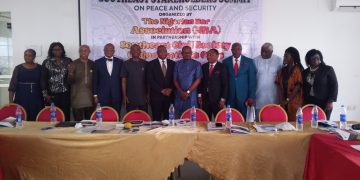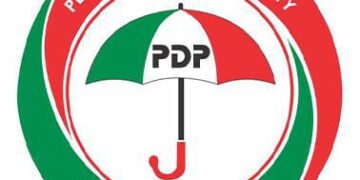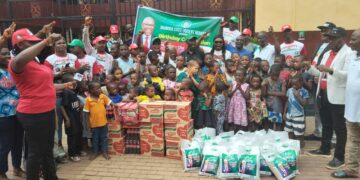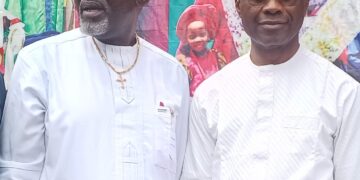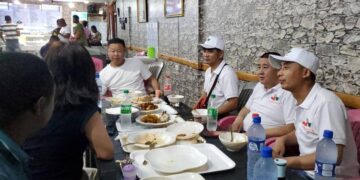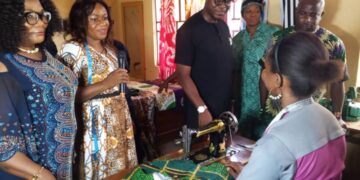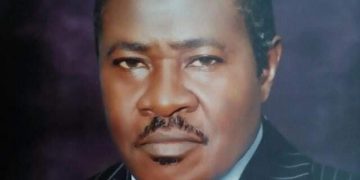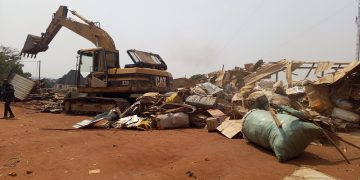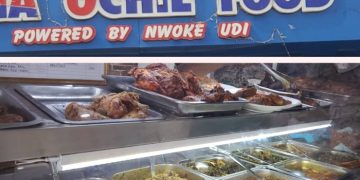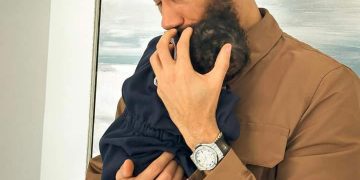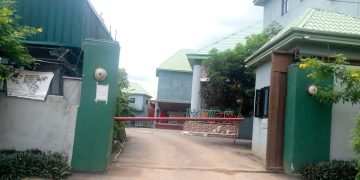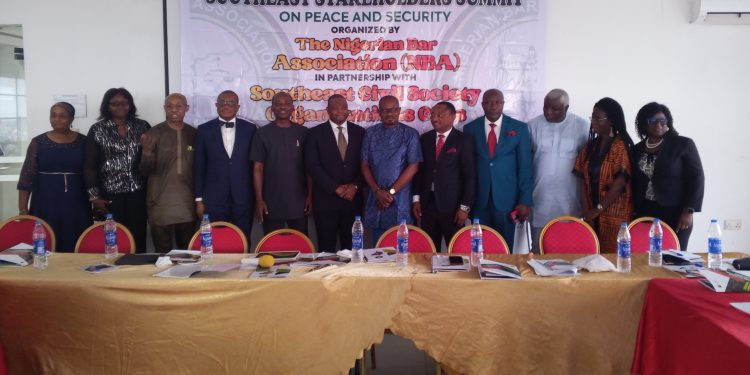RULAAC, NBA And Southeast Insecurity, A Pragmatic Quest
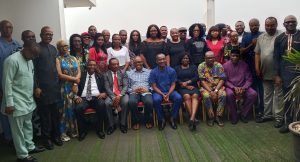
For two days, between Feb. 21 and Feb. 22, stakeholders’ from security agencies, Legal Profession, Civil Society, the Media and citizens converged on Enugu to brainstorm on the security situation in the Southeast geopolitical region of Nigeria..
The event was Organised by the Nigerian Bar Association (NBA) in Partnership With Southeast Civil Society Organisations (CSOs),
The Southeast region which was adjudged by the United Nation has the most peaceful region and safest place to live, trade and invest in Nigeria as recently as 2016 has regrettably degenerated to a theatre of war and existential uncertainty.
The extensive and incisive 2-day expose interrogated and highlighted the origin, nature, colour, shape, trends , theories and conspiracy of insecurity in the once serene and boisterous and enterprising region.
Prof. Chidi Odinkalu, a Frontline human rights activist, social critique and an American based law teacher set the tone for discussion with his keynote address entitled “ Fostering Lasting Peace And Security: Collaborative Approaches To Address Insecurity And Human Rights Violations In South-east Nigeria”.
In the paper Odinkalu adopted a thematic approach to the insecurity in the region drawing historical analysis from the pre-independence era when the Eastern part of Nigeria suffered balkanisation and population figures were deliberately kept low.
Odinkalu said Southeast insecurity was largely influenced by limited geospace land economy, struggle for natural resources, rent seeking and partly imported.
He said the matter was exacerbated by deliberate ploy the kill constructive conversation on grievances of the youth which led to pseudo agitation and branded it terrorism to make way for military action against the people.
He condemned killings and destruction of Southeast lives and property by criminal groups masquerading as agitators and called for collective action among Southeast governors and people to address the challenges.
“This descent from lofty visions of humanism into nearly generalised banditry is mirrored in the descent from Biafra as the elevated Utopia promised by the advocates of the Indigenous People of Biafra (IPOB), into the violent dystopian enclave that now threatens to overtake the region.
“The explanations for this development are by no means unilinear but the condition in which it has left the region is unmistakable.
“This reflexive pathologisation of the region’s insecurity crisis with separatism provides a carapace that is conducive to both human rights violations and insecurity.
“The Nigerian state uses it to justify a response to the region focused essentially on kinetic measures; the non-state perpetrators in the region use it as a cover for what is effectively organized crime with no political demand in view,” he said
The Army expressed commitment to upholding the rule of law and ensuring protection of fundamental human rights in the region.
The General Officer Commanding (GOC) 82 Division, Enugu, Maj.-Gen. Oluyemi Olatoye, represented by the Commander of 105 Division Equipment Support, Brig.-Gen.Sadisu Buhari said there was a need to build an inclusive framework where security interventions align with democratic principles and respect for human dignity.
The GOC said the Nigerian Army had established Civil Human Rights Desk in all divisions and the hotlines for areas under 82 division were – 193 select option 2, which is manned 24 hours daily, to receive complaints.
“I urge you to make use of this medium in reporting alleged cases of fundamental rights by members of the Armed Forces of Nigeria,” he said.
The Police Service Commission in their presentation admitted that there was a worrisome level of human rights abuse by Police and extortion going on at what should have been security checkpoints the road in the Southeast.
DIG Hashimu Argungu (rtd), Chairman of PSC represented by Mr Ikechukwu Ani, its spokesman said it was regrettable that Southeast region had become the hot bed of insecurity in Nigeria and the unofficial headquarters of Human Rights violations.
He said Policemen should not cash in on the insecurity in the area as an excuse to relapse into corruption by the security Agencies.
“We are no more comfortable with the abuse of Office by some security personnel detailed to provide security across this region, we must free the region of these gangs of Policemen.
“The road blocks mounted by these security Agencies have unfortunately turned into toll gates where road users are forced under gunpoint,” he said.
CP Emma Ojukwu (rtd), ex Police Image maker decried the poor condition of Police recruitment and formation process, saying the average Police officer was trained to take a revenge on the society.
He said the Police as a system must treat its personnel the way they want to treat members of the public.
On its part, the Nigeria Bar Association said it had become necessary for the judiciary to rethink their role in the justice administration system in the Southeast.
Maazi Afam Osigwe the President of NBA condemned the shutting down of the Court of Appeal Division in Awka, Enugu, and Owerri on the excuse of insecurity.
Osigwe said the decision amounted to serious violation of the peoples rights to justice and called for immediate reversal of the decision.
He said the NBA was worried about the increasing abuse of processes on the part of both the Bar and Bench and called on self cleaning of the judiciary to restore the confidence of the people in the justice system.
Okechukwu Nwanguma, the Executive Director of Rule of Law and Accountability Advocacy Centre (RULAAC) said the
stakeholders’ engagement was informed by the need to highlight what he described as ‘intractable and debilitating’ challenges of insecurity in Southeast.
He said the situation called for urgent and joint efforts to interrogate and understand the root, nature, facets and effects on the well-being of our people..
“Many of our communities have been overrun and taken over by criminal elements who without mercy and compunction, kill, maim, destroy and rape in an unrestrained reign of terror. Many families have been displaced.
“Women have been rendered widows and childless, girls have been abducted and held as sex slaves, children have been forced to abandon education, traditional rulers have been chased out of their kingdoms.
“The clergy have been kidnapped and killed. Nobody is spared in this abominable reign of terror, we must collaborate to seek solutions to the lingering multidimensional challenges of insecurity and human rights violations,” he said.
The event was chaired by Dr Sam Amadi, the Director of Abuja School of Social and Political Thoughts who says that no one can drive away insecurity without upholding protection of human rights and respect for the sanctity of life.
Amadi re-echoed the call for governors in the zone to synergise and operationalise previous security agreements.
The observed challenges to the search to peace in South include the cross purpose approach of governors in the region who do not see insecurity as a common problem. This was evidenced in the absence of all the states in the region except Enugu the host.
Victims of abuse in the Southeast are also not eager to report their ordeals or pursue their rights maybe of low civic right awareness which emboldens the security agencies to abuse and violate the rights of the people.
